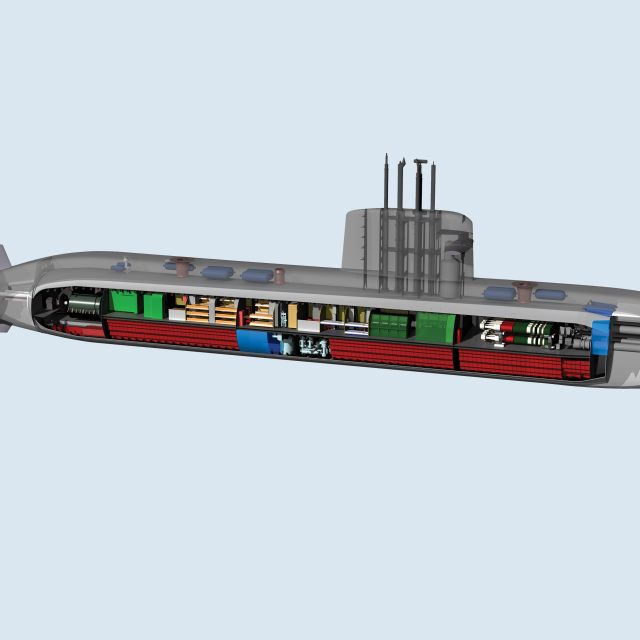Benefits of total battery powered submarines
Are total battery powered submarines the future? Who knows. With modern battery technology the roadmap for total battery powered submarines seems feasible. Simulations with a created concept design show that with current battery technology local to medium range missions are already feasible. This makes a total battery powered submarine an interesting option for navies who want to use their submarine mainly for homeland defence. Changing the conventional diesel-electric powered submarine to a total battery powered submarine could enable more benefits than one might think.

#1 Tactical advantages
The implementation of a total battery powered system will make the propulsion of the submarine air in dependent and will reduce the signature of the submarine. This contributes to an improvement in covertness of the submarine, which is an important tactical advantage.
#2 Reduced amount of installed systems
In addition to the tactical advantages, total battery powered submarines have multiple other benefits. First of all, the amount of installed systems will reduce compared to diesel-electric submarines. In a total battery powered design, no diesel-generator sets are present. This also means that all diesel-generator support systems will be absent. Think about cooling systems, fuel oil and fuel oil compensation systems, air intake system and exhaust gas system. Compared to diesel-electric submarines with an AIP system the reduction in systems is even larger. The reduction in systems will lead to a less complex system integration and platform design.
#3 Less maintenance
The reduction in systems will lead to a reduction in maintenance as well. Diesel-generators sets and their auxiliary systems have high maintenance requirements. The extra amount of installed batteries will not lead to an increase in maintenance, because lithium based technologies do not have maintenance requirements. The reduction in maintenance will increase the availability of the submarine and will reduce the operational costs. Furthermore, the reliability of the submarine will improve due to the reduction in systems.
#4 Reduced workload for the crew
The workload of the crew will reduce due to the reduction in systems. The crew will have fewer systems to monitor, operate and maintain. Not only the control of the propulsion plant will simplify, the control of the underwater systems will simplify as well. For example, the trim and weight disturbances are expected to reduce significantly due to the reduction of consumables and the absence of fuel. This will simplify the trim and weight compensation control. Due to reduction in the workload, a smaller crew size will be possible than in diesel-electric submarines.
#5 Effect on platform safety
With respect to safety, the creation of total battery powered submarine has advantages and disadvantages compared to diesel-electric submarines. The use of large amounts of lithium based batteries will increase the risks of battery fires and explosions. On the other hand, the absence of the lead-acid batteries and diesel-generator sets will reduce the risk of fires and explosions as well. Furthermore, the amount of pressure hull penetrations will be reduced. This will reduce the risks of water intake and leakages.